Spiritual masters. Rumi, Kabir and Hafez. Though born in different lands and centuries, their poetry shares a spiritual resonance, that transcends time and culture. Lal Ded of India, Meera, Rabia and Saint Francis.
"Last night, the cup-bearer’s song
lifted sorrow from my heart—
for a moment, the world was sweet." Hafez
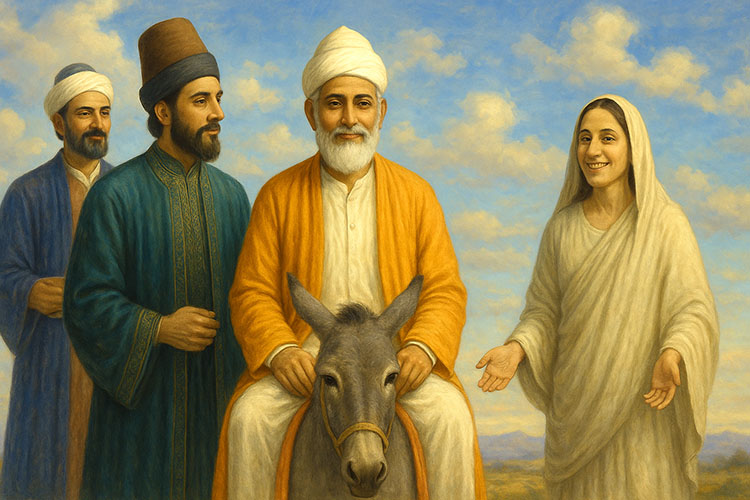
Spiritual masters. Rumi, Hafez, Kabir and Lalla, Meera and Rabia. Also: Saint Francis and John of the Cross.
--------------------------------------------
Kabir was a 15th-century Indian mystic poet and saint, born in or near Varanasi, who is celebrated for his powerful verses that cut across the boundaries of religion and caste. Though his origins are shrouded in legend—some say he was the child of a Muslim weaver—
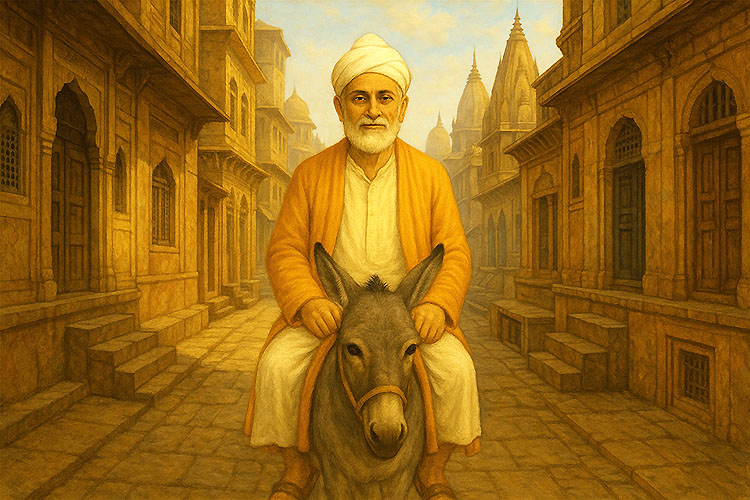
Kabir grew to become a voice of spiritual rebellion, questioning both Hindu and Islamic rituals while calling for a direct, personal experience of the divine. His dohas (couplets) are simple yet profound, filled with metaphors drawn from everyday life, urging people to look beyond external practices and discover God within their own hearts. Kabir’s fearless and universal message of love, truth, and unity has made him one of India’s most beloved saints and poets, with his songs still sung by seekers across generations.
From an early age, Kabir showed a restless spirit, seeking the truth beyond temple bells and mosque calls. He is said to have longed for the guidance of a true master and eventually became a disciple of the great Hindu sage Ramananda, though the story says Kabir did not undergo formal initiation. Instead, he received a single divine word from Ramananda—“Ram”—which became his mantra of love for the formless God.
Kabir lived simply, weaving cloth by day and composing verses that pierced through the hypocrisy of both Hindus and Muslims. He would ride his small donkey through the narrow lanes of Kashi (now Varanasi), singing his bold dohas (couplets) that urged people to look within themselves for God, rather than in rituals or dogma. The people called him Kabir Das, the servant of the Infinite.
Neither Hindu nor Muslim, Kabir was loved and feared for his fearless words. He called for unity, declaring that God is one, beyond name and form. His followers grew among common villagers, saints, and mystics alike. He died around 1518, Toward the end of his life, Kabir moved to Maghar. A tomb and samadhi both exist in Maghar, showing Hindu and Muslim reverence for him.
"I laugh when I hear that the fish in the water is thirsty.
You wander restlessly from forest to forest, while the truth is within your own home. The truth is here! Go where you will—
to Benares or to Mathura; until you have found God in your own soul, the whole world will seem meaningless to you."
---------------------------------------------
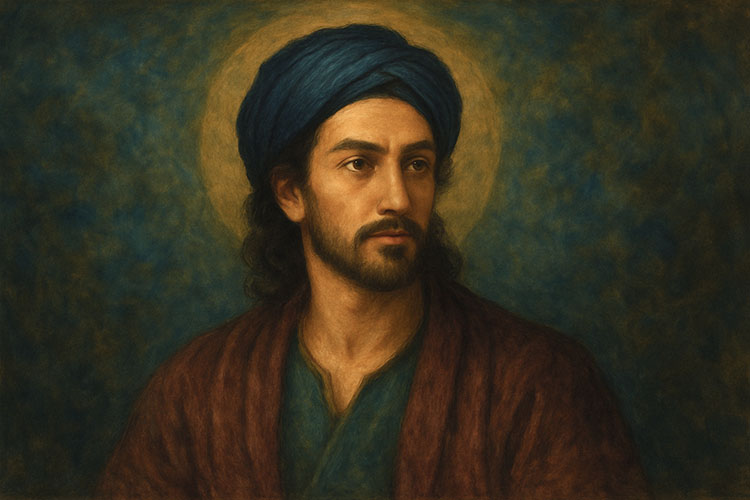
Hafez
Hafez (c. 1315–1390), was a 14th-century Persian poet and mystic born in Shiraz, Iran. He is best known for his masterful ghazals, which speak of divine love, the search for truth, and the longing of the soul to reunite with the Beloved. Hafez’s poetry carries a tone of wisdom, grace, and spiritual insight, often expressed through symbols like the rose, the nightingale, or the cup of wine. His verses question religious pretense and invite the reader to look within for a deeper connection with the Divine. Beloved throughout the Persian-speaking world and beyond . Hafez primarily wrote in the literary genre of lyric poetry or ghazals, which is the ideal style for expressing the ecstasy of divine inspiration in the mystical form of love poems.
Themes of his ghazals include the laments of the lover to the Beloved, many profound spiritual nuggets of Truth and poetic depiction of the stages of inner attainment, as well as an unabashed criticism of hypocrisy. In his ghazals, Hafez deals with subjects like wine (metaphor for divine love), taverns (places of gathering for aspirants), Saqi (wine-bearer, Master), shedding tears of blood (intense longing for the Beloved), and so much more, all representing aspects of the human journey, whether interpreted in the worldly sense or in the voice of the lover of God who has renounced the attractions of the world in exchange for spiritual ecstasy, freedom from orthodoxy, and ultimate union with the real Self (God), which is the destiny of all beings, and the true purpose of life.
The Tavern of Ruin
Last night I went to the tavern of ruin,
the cup-bearer’s hand was filled with grace.
There, in the shattered walls of my heart,
I found the Friend, smiling.
What need have I for heaven or hell,
when the wine of His presence burns within me?
Hafez
Page: Fereshteh Book and more on Hafez HAFEZ POETRY
Video: Peter Booth Talks of Hafez: Peter Booth reads Hafez
-----------------------------------------
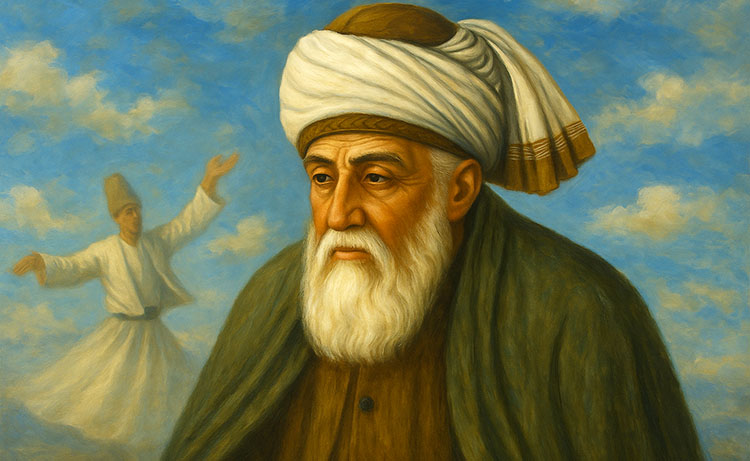
Rumi, born in 1207 in present-day Afghanistan, was a Sufi mystic, poet, and theologian who became one of the most widely read and loved spiritual poets in the world. After meeting his spiritual guide, Shams of Tabriz, Rumi’s life was transformed, and his poetry began to flow with ecstatic love for the divine. His magnum opus, the Masnavi, often called the "Quran in Persian," is a vast collection of stories, parables, and teachings about the soul’s journey toward union with God. Rumi’s poetry, filled with the imagery of longing, music, dance, and love, transcends religious boundaries, speaking directly to the heart of anyone seeking truth. Today, Rumi’s verses continue to inspire people globally, celebrated for their timeless wisdom and universal call to divine love and unity.
"The minute I heard my first love story, I started looking for you, not knowing how blind that was. Lovers don’t finally meet somewhere. They’re in each other all along".
Rumi. Jalal ad-Din Muhammad Rumi, known simply as Rumi, was born in 1207 in the city of Balkh, in present-day Afghanistan, though his family fled westward due to the threat of Mongol invasions. After years of travel through cities like Nishapur, Baghdad, and Mecca, his family eventually settled in Konya, in present-day Turkey, which was then part of the Seljuk Empire.
Rumi became a prominent Islamic scholar, theologian, and mystic in Konya, but his life was transformed by his meeting with the wandering dervish Shams of Tabriz, whose companionship awakened in him a deep and poetic longing for the divine. After Shams’ mysterious disappearance, Rumi turned increasingly inward, composing thousands of verses of spiritual poetry. He died in Konya in 1273, where his tomb—now a major pilgrimage site—is part of the Mevlana Museum, attracting admirers from around the world.
"The Guest House"
translated by Coleman Barks
This being human is a guest house.
Every morning a new arrival.
A joy, a depression, a meanness,
some momentary awareness comes
as an unexpected visitor.
— Jalal al-Din Rumi
================================
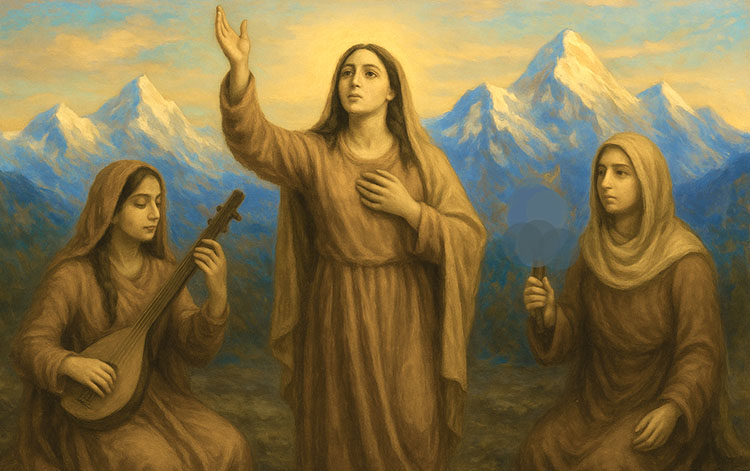
Rabia, Meera, and Lalla — women saints whose poetry of divine love has echoed through the centuries, touching hearts and guiding seekers on the path to God.
--------------------------------------------
Rabia al-Adawiyya
Rabia al-Adawiyya (c. 717–801), born in Basra, Iraq, was one of the earliest and most revered Sufi saints. Known for her profound devotion, she taught that true love for God should be free from hope of reward or fear of punishment. Her brief, radiant sayings reveal a heart absorbed in divine presence. Though she left little written work, her legacy lives on through the purity and intensity of her spiritual vision.....
" Brothers, my peace is in my aloneness. My Beloved is alone with me there, always. I have found nothing in all the worlds that could match His love, this love that harrows the sands of my desert. If I come to die of desire and my Beloved is still not satisfied, I would live in eternal despair. To abandon all that He has fashioned and hold in the palm of my hand certain proof that he loves me- That is the name and the goal of my search."...
Meera Bai - Mihira. and Her Lord Krishna:
Mirabai (c. 1498–c. 1547) was a saint-poet of Rajasthan, India, whose devotional songs to Lord Krishna are still sung today across the country. Even when she grew up, she believed that Sri Krishna would marry her. She was beautiful and peaceful at heart. Eventually she had to marry Rana Sanga on the insistence of her family. But Meera’s love and devotion for Krishna did not diminish.Born into royalty, she renounced the comforts of palace life to follow the inner call of divine love. Her verses, composed in the vernacular, speak with directness, longing, and joy, expressing a deep personal relationship with Krishna. She rejected social conventions and emphasized the soul’s love for God over ritual or tradition.
" I am dyed in the color of my beloved. I have given up everything for him— my family, my honor, my pride.
Only Krishna dwells in my heart now.The dark one, the flute player, the enchanter of souls."
— Meera Bai
Lalla (Lalleshwari)
Lalla (c. 1320–1392), also known as Lalleshwari, was a mystic poet from Kashmir whose verses, called vakhs, were among the earliest recorded in the Kashmiri language. She wandered as an ascetic, shedding the forms of both Hindu and Muslim orthodoxy in search of truth. Her poems are filled with luminous insight and speak of the inner path, the unity of being, and the presence of the Divine within...
"Lord I 've never known who I really am, or you. I threw my love away on this lousy carcass and I never figured it out: You'r me, I'm you. All I ever did was doubt: Who am I? Who are you? "
Lal Ded Story: Watch on YouTube
==============================
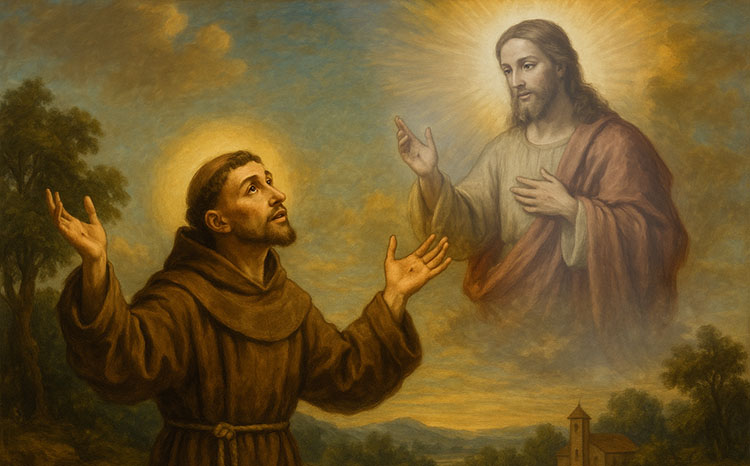
St. Francis of Assisi (c. 1224)
St. Francis of Assisi (c. 1181–1226) was born into a wealthy merchant family in Assisi, Italy. As a young man, he lived a carefree and worldly life until a series of spiritual experiences led him to renounce his wealth and devote himself completely to God. Embracing a life of poverty, humility, and service, he cared for the poor and the sick, preached peace, and regarded all creatures as his brothers and sisters. He founded the Franciscan Order, which emphasized simplicity, compassion, and a deep love for nature. He died in 1226. He is remembered as the patron saint of animals and the natural world.
'The Canticle of the Sun'
St. Francis of Assisi
" Praised be You, my Lord,
.......with all Your creatures, Especially Sir Brother Sun,
Who is the day and through whom You give us light.
And he is beautiful and radiant with great splendor;
And bears a likeness of You, Most High.
....... through Sister Moon and the stars,
In heaven You formed them clear and precious and beautiful.
....... through Brother Wind, And through the air, cloudy and serene, and every kind of weather, Through whom You give sustenance to Your creatures.
........ through Sister Water,
Who is very useful and humble and precious and pure.
........ through Brother Fire, Through whom You light the night,
And he is beautiful and playful and robust and strong.
........ through our Sister Mother Earth,
Who sustains and governs us,
And who produces varied fruits with colored flowers and herbs.
================================